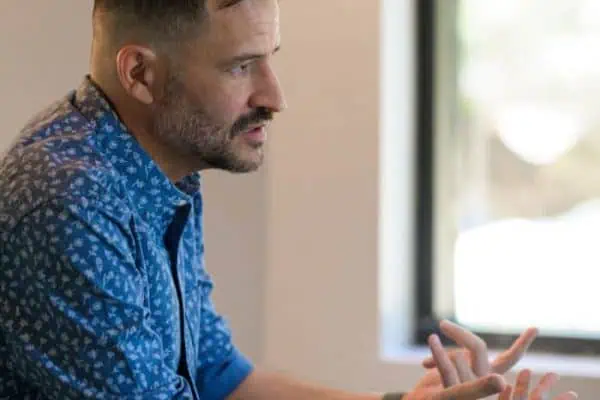By William Schroeder, LPC, NCC
Healing trauma in relationships isn’t a straight path and it definitely isn’t easy. It takes patience, compassion, and a willingness to acknowledge that your reactions (and your partner’s) aren’t always about the present moment. When both partners have lived through difficult experiences, it’s easy to get tangled in old survival patterns. The real work is learning how to notice those patterns without shame and how to safely turn toward each other rather than away.
And no, this doesn’t mean dissecting every conflict with a whiteboard. It often starts with something much simpler: noticing what’s happening in your body and between you.
Healing Trauma in Relationship: Recognizing How Trauma Shows Up
Trauma doesn’t just live in our memories it lives in our nervous systems. That’s why it can show up unexpectedly: in your tone, your silence, your sudden need to escape a conversation, or even in how quickly you want to get close to someone. You might feel anxious, shut down, get defensive, or trust too quickly because closeness feels like safety.
Regrettable moments happen. It’s what we learn from them that matters most, and that we reconnect and repair properly afterwards.
One of the most helpful things you can do is simply begin to notice these reactions without judgment. When people start to identify where their responses are coming from – fear, abandonment, shame, overwhelm – they open the door to compassion, both for themselves and their partner.
EMDR therapy or trauma-informed individual counseling can help unpack those deeper experiences, but in your relationship, the focus is less on “fixing” and more on recognizing when old wounds are getting stirred up.
Pay attention to early signs such as tightening in your chest, heat in your face, an urge to defend or pull away, or when your partner’s expression suddenly feels threatening, even when it isn’t. These are nervous system reactions, not character flaws.
Questions to Explore Together
- What moments tend to escalate quickly?
- What parts of past experiences might still be shaping how we react today?
- When one of us gets overwhelmed, how can the other offer support—without fixing, judging, or withdrawing?
Building a Safe and Predictable Environment
Trauma healing thrives on predictability, emotional safety, and consistency. That doesn’t mean avoiding conflict. It means knowing how to pause, settle, and get back to connection without blaming or retreating.
Sometimes safety looks like slowing down, not solving everything.
Simple ways to build safety:
- Schedule regular check-ins that aren’t just about problems, ask “How are we doing?”
- Communicate immediate needs: “I need a moment,” “I’m feeling overwhelmed,” or “I just need you to sit with me.”
- Use a code phrase or signal when you’re overloaded.
- Take co-regulating breaks—walk together, breathe slowly side by side, or just sit quietly without talking.
These small rituals send a powerful message to your nervous systems: we’re safe, we’re connected, we’ll get through this.
The Power of Empathetic Communication
Trauma can make the brain interpret neutral situations as threatening. A pause, a distant tone, or a raised eyebrow can trigger old stories like “I’m not safe,” “I’m about to be abandoned,” or “I’m being criticized.”
That’s why how you say something often matters more than what you say.
Helpful ways to communicate:
- Reflect back: “I hear that you’re feeling anxious about…”
- Clarify instead of assume: “Can you help me understand what felt hurtful there?”
- Focus on your experience rather than blame: “I get defensive when I feel misunderstood—it’s not about you, it’s my history.”
- Agree on how to repair: decide ahead of time how to pause, reset, and reconnect when things get too heated.
Communication isn’t just about understanding, it’s about helping each other feel emotionally safe.
Progress Over Perfection
Trauma-informed couples counseling can be incredibly helpful, especially with someone trained in both trauma and attachment work. But counseling isn’t a magic reset button. There will still be moments when old patterns show up. The goal isn’t to eliminate triggers, it’s to recognize them faster, respond more gently, and return to connection more quickly.
I often tell couples: it’s not about perfection. It’s about noticing, pausing, and repairing.
Supporting Your Own Healing
To be emotionally present with your partner, you need to take care of your own system. Self-regulation is the foundation of co-regulation.
Ways to support your own emotional health:
- Use breathing, stretching, or mindfulness to help regulate stress
- Go for walks—alone or together
- Journal to process thoughts before reacting to them
- Keep hobbies that replenish your energy and help you feel grounded
You don’t have to be fully healed to be a good partner. You just need to be aware of when you’re overwhelmed and willing to slow down.
Growing Together
Healing as a couple is less about dramatic breakthroughs and more about consistent, small moments done differently. Creating shared rituals—like making coffee together, going on weekly walks, or simply asking “How are we doing?” – can slowly rewrite your nervous system’s sense of safety.
Signs of progress:
- Arguments feel less explosive and end more quickly
- One of you can say “I’m triggered” and the other responds with care
- Humor and warmth return more quickly after stress
- You recover faster when things go off track
These shifts might seem small, but they’re actually signs of a healing relationship.
Trauma may shape our reactions, but it doesn’t have to shape the future of our relationships. With compassion, practice, and partnership, healing is not only possible, it’s deeply transformative.
*additional resource: learn more about EMDR Therapy




